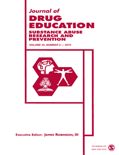
JOURNAL OF DRUG EDUCATION
Scope & Guideline
Bridging Theory and Practice in Drug Education.
Introduction
Aims and Scopes
- Substance Use Prevention and Education:
The journal emphasizes research aimed at preventing substance use, particularly among youth and vulnerable populations, exploring educational interventions and curriculum effectiveness. - Behavioral and Psychological Factors:
Research examining the psychological and behavioral dimensions of substance use, including motivations, expectancies, stigma, and decision-making processes among various demographics. - Policy and Community Interventions:
The journal explores the impact of policy changes on substance use behavior and community-based interventions aimed at reducing drug-related harms. - Health Outcomes and Risk Perception:
Studies that investigate the health outcomes associated with substance use, as well as how risk perceptions influence usage patterns and behavior change. - Cultural and Contextual Influences:
Research that takes into account cultural, social, and environmental contexts in understanding substance use behaviors and interventions.
Trending and Emerging
- Alcohol Use and Interventions:
Recent publications show a strong emphasis on alcohol-related research, including interventions and behavioral strategies to mitigate its negative consequences, reflecting ongoing public health concerns. - Impact of COVID-19 on Substance Use:
There is an emerging trend analyzing the effects of the COVID-19 pandemic on substance use behaviors, particularly among vulnerable populations, highlighting the need to understand changing patterns due to global crises. - Stigma and Substance Use Disorders:
Increasing attention is being paid to the stigma surrounding substance use disorders, particularly in healthcare settings, which is crucial for improving treatment outcomes and professional decision-making. - Culturally Adapted Interventions:
The journal is seeing a rise in research focused on culturally tailored interventions for specific populations, such as American Indian youth, emphasizing the importance of culturally relevant approaches. - Harm Reduction Strategies:
There is a growing focus on harm reduction approaches, such as community-based interventions and educational programs aimed at reducing the risks associated with substance use, reflecting a broader acceptance of these strategies in public health.
Declining or Waning
- Caffeine and Non-Alcoholic Substances:
Research focusing on caffeine and its effects has appeared less frequently, possibly indicating a shift in focus towards more pressing issues related to alcohol and illicit substances. - Tobacco Use and Education:
There is a noticeable decrease in studies specifically addressing tobacco use and cessation programs, suggesting that the journal may be prioritizing more contemporary issues such as opioid use and marijuana. - Historical Contextual Studies:
Research that delves into historical patterns of substance use or educational methods from earlier decades is less prevalent, indicating a shift towards current trends and real-time interventions.
Similar Journals

Adicciones
Exploring the complexities of substance use and recovery.Adicciones is a prominent academic journal dedicated to the fields of Medicine and Psychiatry, focusing on the multi-faceted issues surrounding addiction and substance use. Published by SOCIDROGALCOHOL in Spain, this journal has been a critical resource for researchers, clinicians, and students since its inception in 1994, with a commitment to advancing knowledge in addiction science for the benefit of public health. With an impressive impact factor that places it in the Q3 category of both Medicine (Miscellaneous) and Psychiatry and Mental Health according to 2023 rankings, Adicciones is recognized for its high-quality peer-reviewed articles that contribute to the ongoing dialogue in these vital fields. Although not currently an open-access journal, it provides valuable subscription-based access to its extensive repository of research findings and reviews, fostering a deeper understanding of the complex dynamics of addiction. The journal's continued relevance is underscored by its convergence into 2024, promising ongoing contributions that inspire new ideas and practices to combat addiction.
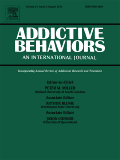
ADDICTIVE BEHAVIORS
Exploring the Depths of Addiction ScienceADDICTIVE BEHAVIORS is a prestigious journal published by PERGAMON-ELSEVIER SCIENCE LTD, specializing in the critical examination and exploration of addiction-related issues across diverse fields including Clinical Psychology, Psychiatry and Mental Health, and Toxicology. With a robust history dating back to 1975 and convergence extending to 2024, the journal is esteemed for its rigorous peer-reviewed research that contributes significantly to understanding addiction phenomena. Ranked in the Q1 category for its focus areas, it stands out within the academic community, evidenced by its impressive Scopus rankings—25th in Clinical Psychology and 14th in Toxicology—placing it in the top tier of its disciplines. This journal offers valuable insights into addiction behaviors, treatment methodologies, and public health implications, making it an essential resource for researchers, practitioners, and students seeking to advance their knowledge and impact the field. Although not Open Access, it provides vital access options for institutions and individuals invested in addiction studies.
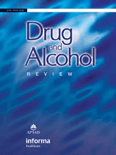
DRUG AND ALCOHOL REVIEW
Advancing understanding of substance use and addiction.DRUG AND ALCOHOL REVIEW, published by Wiley, is a leading journal dedicated to advancing the scholarship in the fields of drug and alcohol research. Since its inception in 1989, this esteemed publication has provided a critical platform for the dissemination of innovative research findings, reviews, and theoretical papers, addressing pressing issues in substance use and addiction. With an impact factor that places it in the Q1 category in both Health (social science) and Medicine (miscellaneous), it ranks #78 out of 371 in the Scopus index for Health and #115 out of 398 in Medicine, reflecting its significant influence and high citation rates among scholars. The journal is committed to fostering a multidisciplinary approach, integrating perspectives from psychology, sociology, public health, and medicine, to inform policy and practice. Accessible to researchers and practitioners alike, *DRUG AND ALCOHOL REVIEW* serves as an essential resource for anyone invested in understanding and addressing the complexities of drug and alcohol use in society.
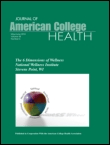
JOURNAL OF AMERICAN COLLEGE HEALTH
Empowering Student Wellness Through ResearchJOURNAL OF AMERICAN COLLEGE HEALTH is a leading peer-reviewed journal dedicated to the field of public health, with a specific focus on the health and wellness of college students. Published by Routledge Journals, Taylor & Francis Ltd, this respected periodical boasts an impressive impact factor and is well-regarded within its discipline, evidenced by its Q2 ranking in 2023 for Public Health, Environmental, and Occupational Health. The journal serves as an essential resource for researchers, healthcare professionals, and students alike, providing critical insights and fostering dialogue about health issues affecting young adults in academic settings. Covering a wide range of topics from mental health to preventive measures, the journal publishes high-quality original research, reviews, and discussions, aiming to improve health policy and practice in college environments. With years of continuous publication since its inception in 1984, the JOURNAL OF AMERICAN COLLEGE HEALTH is a cornerstone of scholarly communication in the pursuit of enhancing the health of students across the United States and beyond.
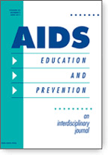
AIDS EDUCATION AND PREVENTION
Transforming HIV Education and Prevention StrategiesAIDS Education and Prevention is a distinguished journal dedicated to the exploration of strategies for HIV/AIDS education, prevention, intervention, and policy. Published by Guilford Publications Inc, this journal has been a pivotal resource in the fields of Health (social science), Infectious Diseases, Medicine, and Public Health since its inception in 1989, and continues to be influential through 2024. With its respectable placement in the Q2 category across multiple disciplines, it offers high-impact research and practical insights that are essential for researchers, healthcare professionals, and students alike. Although not an Open Access journal, its compelling content and strict peer-review processes ensure that published works maintain high academic standards. The journal's contributions are integral in addressing the challenges surrounding HIV prevention and education, fostering a deeper understanding and knowledge that can lead to effective community responses.

Addiction Science & Clinical Practice
Transforming addiction treatment through evidence-based insights.Addiction Science & Clinical Practice is a premier open-access journal dedicated to advancing the understanding and treatment of addiction through evidence-based research and clinical practice. Published by BMC in the United Kingdom since 2007, this journal has significantly impacted the fields of Clinical Psychology, Medicine, and Psychiatry and Mental Health, proudly securing a Q1 ranking in multiple categories as of 2023. With an emphasis on high-quality research, the journal provides an inclusive platform for the dissemination of innovative findings and clinical insights that address the complexities of addiction. Researchers, practitioners, and students alike benefit from its unrestricted access since 2012, allowing for widespread dissemination of knowledge. Located at CAMPUS, 4 CRINAN ST, LONDON N1 9XW, the journal continues to lead the way in fostering collaboration and informing best practices in addiction science.
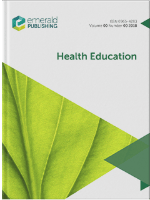
Health Education
Innovating Strategies in Health Education.Health Education is a distinguished journal published by Emerald Group Publishing Ltd, focusing on the dynamic fields of health education and public health. With an ISSN of 0965-4283 and an E-ISSN of 1758-714X, this journal serves as a vital resource for researchers, professionals, and students committed to advancing knowledge and practice in health education. Since its inception in 1992 and continuing through to 2024, Health Education aims to disseminate high-quality research that contributes to the understanding and implementation of effective health education strategies. Ranked in the second quartile for Education and third quartile for Public Health, this journal has established its significance within the academic community, evidenced by its Scopus rank of #581 in Social Sciences Education and #346 in Medicine, Public Health. Although not an Open Access journal, the publication strives to provide meaningful insights and innovative solutions aimed at enhancing health outcomes and promoting health literacy. The journal continues to be an essential platform for those dedicated to exploring new trends and methodologies in the field of health education.
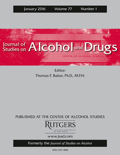
Journal of Studies on Alcohol and Drugs
Advancing knowledge on substance use and society.The Journal of Studies on Alcohol and Drugs is a premier academic journal dedicated to advancing the understanding of alcohol and drug use, its effects, and its societal implications. Published by ALCOHOL RES DOCUMENTATION INC at the Center for Alcohol Studies, Rutgers University, this journal features comprehensive research that spans the disciplines of health, psychiatry, mental health, and toxicology. With its Q1 ranking in Health (Social Science) and Q2 ranking in Psychiatry and Mental Health, the journal plays a vital role in disseminating high-impact research that informs policy, prevention, and treatment strategies in addiction and substance use. The journal contributes significantly to the field, as evidenced by its solid Scopus rankings and engagement with contemporary issues, making it an essential resource for researchers, practitioners, and students. Although it does not offer open access, the journal's commitment to rigorous peer review and scholarship ensures that it remains at the forefront of research on alcohol and drugs through its converged publication timeline from 2007 to 2024.
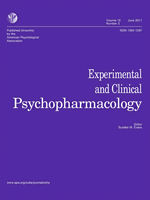
EXPERIMENTAL AND CLINICAL PSYCHOPHARMACOLOGY
Bridging Research and Clinical Practice in PsychiatryEXPERIMENTAL AND CLINICAL PSYCHOPHARMACOLOGY, published by the American Psychological Association, stands as a pivotal resource within the fields of pharmacology and psychiatry. With an ISSN of 1064-1297 and an E-ISSN of 1936-2293, this journal contributes significantly to the understanding of psychopharmacological interventions through its rich array of research articles, reviews, and clinical studies. Classified within the Q2 category in both Pharmacology and Psychiatry and Mental Health, it reflects a solid standing in academic performance, evidenced by its rankings in Scopus, where it places within the top half of its categories. Spanning from 1993 to 2024, it seeks to provide an essential platform for the dissemination of knowledge and advancements that influence clinical practice and therapeutic approaches. Although not an open-access journal, its impact on the development of evidence-based psychopharmacological treatments cannot be overstated, making it a vital resource for researchers, clinically active professionals, and students eager to stay abreast of cutting-edge developments in mental health and pharmacology.

Harm Reduction Journal
Exploring the forefront of addiction research and policy.Welcome to the Harm Reduction Journal, a premier academic platform published by BMC, dedicated to advancing the field of harm reduction since its inception in 2004. With an impressive track record as an Open Access publication, this journal addresses critical topics within the broad scope of medicine, psychiatry, and public health, making it indispensable for researchers, healthcare professionals, and students alike. As of 2023, it proudly holds a Q1 ranking in prestigious categories including Medicine (Miscellaneous), Psychiatry and Mental Health, and Public Health, Environmental and Occupational Health, reflecting its high impact and significance in the academic community. The journal is notable for its comprehensive discussions on innovative harm reduction strategies, public policy considerations, and evidence-based practice, fostering collaboration and knowledge exchange. With a global reach and commitment to enhancing health outcomes, the Harm Reduction Journal serves as a vital resource in the ever-evolving landscape of public health and addiction research.